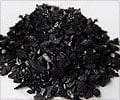Governments and scientists around the world are working hard to reduce emissions of carbon dioxide - one of the greenhouse gasses blamed for global warming.
One idea put forward by researchers in Germany could see algae being used to soak up carbon dioxide emissions from power plants to eventually produce biofuels."In 10 years' time we could see areas of 20 to 30 km along the Mediterranean coast being used to transform carbon dioxide," says Professor Laurenz Thomsen from Jacobs University in Bremen.
Laurenz envisions the construction of so-called algae-based bioreactors where carbon dioxide emissions are sucked from power plants' exhausts and mixed with salt water.
The algae not only withdraw the harmful carbon dioxide emissions from the atmosphere, but it also produces biomass, which could be used for fuels like ethanol in powering motor vehicles.
According to Thomsen, biomass could also find another use in the construction industry where it could be turned into insulation material for homes and other buildings.
"But we still require more research in this direction," he says.
Advertisement
There are already carbon-capturing systems in operation where carbon dioxide emissions from power plans are sequestered underground in shafts and mines.
Advertisement
One drawback, however, is that algae-based bioreactors require large areas of space and plenty of sun to operate effectively.
Thomsen is aware of this and has earmarked sites on unusable agricultural land in the south of Spain and elsewhere in the Mediterranean region.
The algae are suspended in nutrient-rich seawater in cylinders and do not come into contact with the soil. The location does not necessarily have to be close to the sea, he says.
The algae use the carbon dioxide, along with sunlight and water, to produce sugars by photosynthesis, which are then metabolised into fatty oils and protein.
As the algae grow and multiply, portions of the brew are continually withdrawn from each reactor and dried into cakes of concentrated algae, which can be turned into biodiesel or ethanol through further processing.
"Bioreactors alone will not be effective in combating climate change," says Thomsen. "But they are another link in the chain."
"At present, the technology needed to develop the process is expensive and the energy costs are also very high," he says.
In a bid to keep down costs, Jacobs University is working with a company that cleans water used by ships as ballast. The idea is to use algae in the cleansing process.
"This method will help us with our technology," Thomsen says, adding that it could also help reduce energy and production costs.
"What we need is pilot bioreactor to show that the process can become cost-effective. Basically, it's just a matter of time."
Source-IANS
VEN /J






